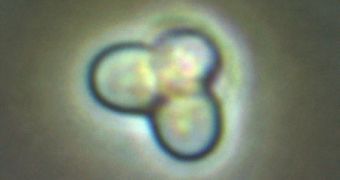Scientists have only recently discovered an alga that is extremely potent, in that it has the natural ability to detoxify the deadly poison arsenic. The tiny organism, which is actually a simple unicellular alga known as Cyanidioschyzon, can metabolize the chemical in places where the latter occurs naturally, such as in areas around hot springs. Montana State University Department of Land Resources and Environmental Sciences professor Tim McDermott envisages numerous uses for the organism, such as cleaning arsenic-laden mines, contributing to the success of space missions, and cleaning contaminated food supplies around the world.
Safer foods and herbicides could also be generated, if scientists manage to harness the natural power of Cyanidioschyzon. A paper detailing the exact mechanisms through which the alga acts on arsenic is published in this week's edition of the journal Proceedings of the National Academy of Sciences (PNAS). Florida International University researcher Barry Rosen has been the other lead author of the study. California Polytechnic State University faculty member Corinne Lehr is among the four scientists who have co-authored the work.
“These algae are such a dominant member of the microbiology community that they can't escape notice, but for some reason they have not attracted much attention. These algae live in areas of Yellowstone that are extremely toxic with respect to arsenic. You couldn't drink these waters even if you changed their pH,” McDermott says. The organism has been found living in the Yellowstone National Park, in waters around the Norris Geyser Basin, which reach 155 degrees Fahrenheit (57 degrees Celsius). The pH level in that area is of 0.5 to 3.5, which means that they are extremely acidic.
“It gives us insight into how life adapts to extreme environments. If life can grow at high temperatures and high concentrations of heavy metals like arsenic, life might be able to evolve on other planets or moons such as Titan or Enceladus,” Rosen adds, arguing that space exploration may be one of the fields to benefit from the find, even though the two seem completely unrelated.
“Some plants, such as rice, accumulate high concentrations of arsenic. This endangers our food supply. Rice with high amounts of arsenic won't kill anyone quickly, but does increase the risk of cancers such as bladder cancer,” he concludes.

 14 DAY TRIAL //
14 DAY TRIAL //